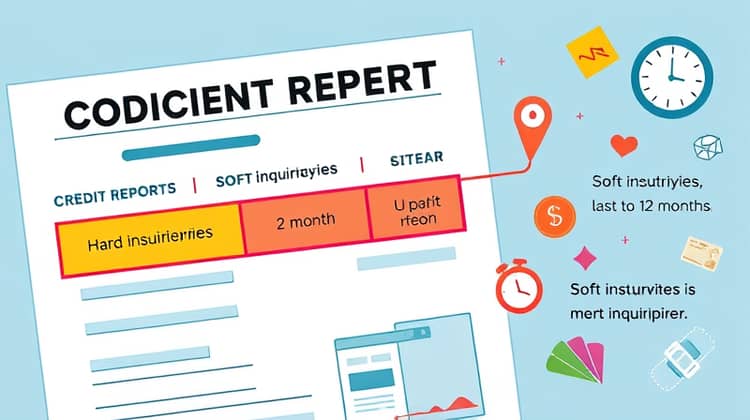Credit inquiries are a crucial aspect of your credit history, influencing your credit score. This score can impact your ability to secure loans, mortgages, and even employment opportunities. Understanding how these inquiries work is essential in managing your credit effectively.
Credit inquiries occur whenever you or a lender checks your credit report. Lenders often conduct inquiries before approving credit applications, and both hard and soft inquiries exist. An informed approach to credit inquiries will help you maintain a healthy credit score and make wise financial decisions.
Types of Credit Inquiries

Credit inquiries come in two primary forms: hard inquiries and soft inquiries. Understanding the difference between the two is fundamental to managing your credit profile effectively.
Hard inquiries take place when lenders or creditors check your credit report as part of their decision-making process for granting credit. Soft inquiries occur when you check your own credit or when a lender performs a background check without the intent of lending money.
- Hard Inquiries: Effect your score and stay on your report for up to two years.
- Soft Inquiries: Do not affect your credit score and remain as a record for a shorter time.
Recognizing the types of inquiries is vital for anyone looking to manage their credit score.
How Credit Inquiries Affect Your Score

Credit inquiries can have varying impacts on your credit score, often depending on their nature. Usually, a hard inquiry can lower your score by a few points, but this effect is typically short-lived.
When multiple lenders assess your credit simultaneously for a single loan type, such as a mortgage or auto loan, these inquiries might be grouped together and only counted as one.
- Hard inquiries can remain on your credit report for up to two years and can lower your score by around 5 points.
- The overall impact of hard inquiries diminishes over time as your credit history improves.
Understanding how inquiries can impact your score is crucial for making informed decisions during the credit application process.
Soft Inquiries vs. Hard Inquiries

One significant distinction between soft and hard inquiries is their impact on your credit score. Soft inquiries do not affect your score, meaning you can check your credit without concern for adverse effects.
In contrast, hard inquiries can lead to a minor decrease in your credit score, which is important for those applying for loans or credit cards. It is essential to handle these inquiries with care, particularly if you're planning to apply for multiple credit lines in a short period.
- Soft inquiries include checking your own credit, pre-approved credit offers, or background checks by employers.
- Hard inquiries occur only when you apply for new credit, such as a loan or credit card.
In summary, knowing the difference between soft and hard inquiries allows you to navigate your credit behavior more consciously, helping you maintain a healthy credit score. The focus should be on minimizing hard inquiries while regularly monitoring soft inquiries.
How Long Do Inquiries Stay on Your Credit Report?

Understanding the duration of credit inquiries on your report is also crucial. Hard inquiries can affect your credit score for up to two years. However, they usually only have a significant impact for the first six months.
Soft inquiries, on the other hand, do not affect your score but are retained for a shorter time, typically remaining as a record for up to 12 months.
Reducing the Impact of Hard Inquiries

While hard inquiries can affect your credit score, there are strategies to mitigate their impact. Be strategic about when and how often you apply for credit, as multiple hard inquiries in a short time frame can lead to a more significant decrease in your score.
- Limit applications: Only apply for credit when necessary.
- Space out credit applications: Try to wait several months between applications.
- Consider pre-qualification: Check eligibility without triggering a hard inquiry.
By applying these tactics, you can reduce the negative impact of hard inquiries on your credit profile, ensuring your score remains as high as possible.
Final Thoughts

Navigating the complexities of credit inquiries is essential for maintaining a healthy credit score. While they can seem daunting, understanding their implications allows you to make better financial decisions.
By monitoring your credit and being strategic about inquiries, you can protect your score and ensure that your financial future remains bright.














